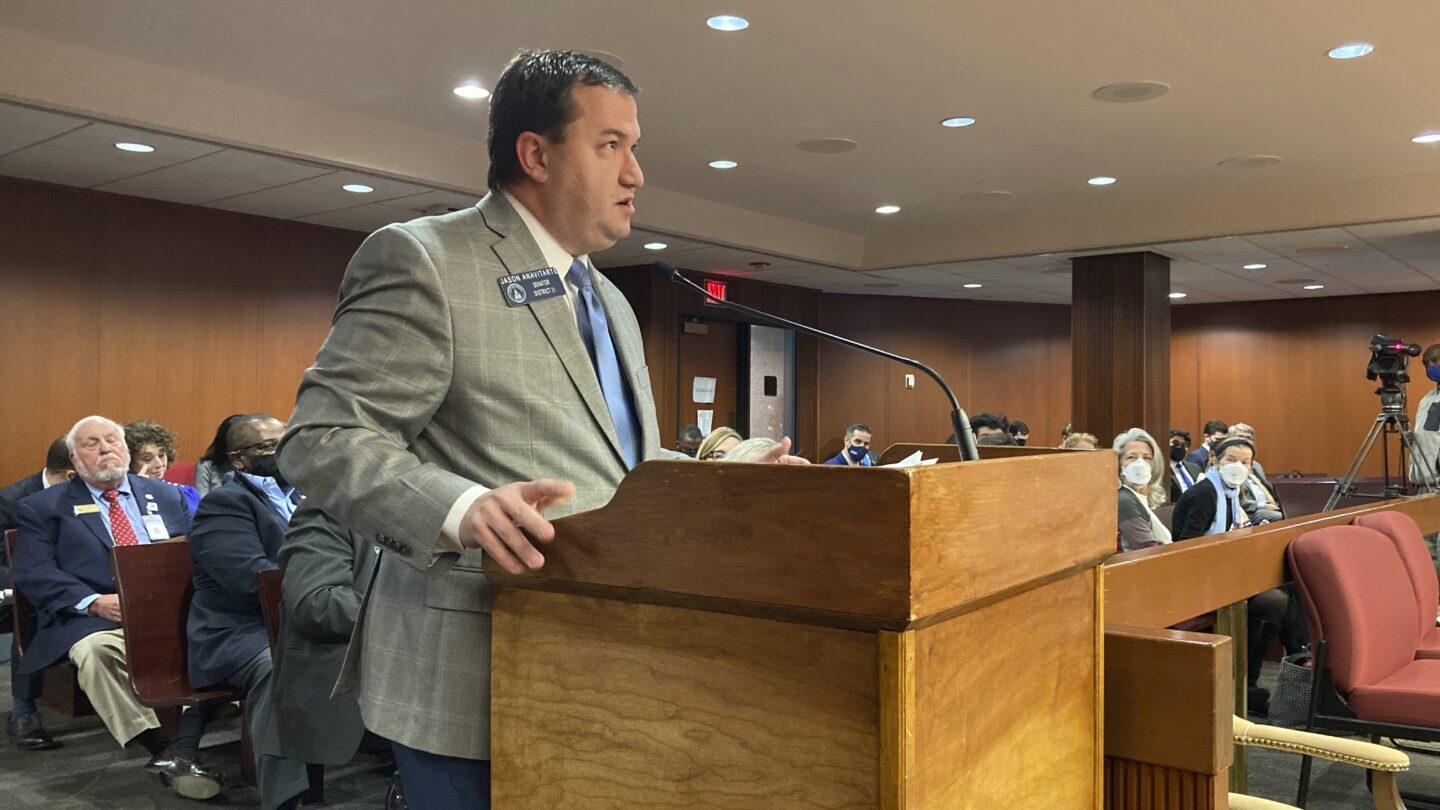Advocates warn Georgia law banning land sales to agents of 'foreign adversaries' targets some Chinese citizens

Republican state Sen. Jason Anavitarte, of Dallas, speaks to a House subcommittee on Tuesday, Jan. 25, 2022, at the Capitol in Atlanta. Anavitarte is a sponsor of SB 240 and was outspoken in support of the measure. (AP Photo/Jeff Amy, File)
A new law in Georgia bans agents from countries deemed foreign adversaries from buying agricultural land and property within 10 miles of a military installation in the state.
Georgia joined other states around the country in adopting these kinds of laws that often target China and other countries with non-democratic governments, like Russia and Cuba. Georgia lawmakers have worked on this legislation for a few years.
Republican lawmakers championed the legislation, S.B. 420, saying it protects national security interests in the state. Critics of the law, including state Democrats and immigrant rights advocates, warn the legislation is reminiscent of old, discriminatory laws against Asian people.
The law defines an agent from a foreign adversarial country as anyone who works for or acts in the service of a country.
(Credit: Jasmine Robinson/WABE)
“I want to address a topic that’s been garnering a lot of attention, which is basically the purchase of U.S. farmland by investors in the CCP (Chinese Communist Party),” said Republican Senator Jason Anavitarte during a hearing on the legislation in the capitol.
“Our farmland isn’t merely a commodity that should be bought and sold,” he said. “It’s the source of our nation’s food supply and the livelihood of countless American farmers and rural communities across Georgia.”
Lawmakers nationwide have discussed this at length in the last decade. They raised concerns about threats to the U.S. pork supply when a Chinese corporation bought pork producer Smithfield Foods in 2013. Later, security officials in Washington, D.C. raised red flags when a Chinese company bought land near an air force base in North Dakota in 2021, saying the proximity would grant Chinese intelligence access to U.S. secrets.
Earlier this year in Southeastern Georgia, four Chinese citizens were arrested and charged with felonies for growing and possessing marijuana. The Pierce County Sheriff said it was the single largest marijuana seizure in the county, valued at more than $22 million in drugs.
But an NPR investigation last year found that Canada owns the most U.S. land among foreign countries. China isn’t in the top 10 countries that own U.S. land.
“It seems to be a geopolitical issue that has seeped into the federal and the state level,” said Thong Phan, a policy analyst for Asian Americans Advancing Justice Atlanta. He’s tracked legislation banning noncitizens from buying land in the South.
Phan says some states have had problems with their laws, like Florida, which is facing a discrimination lawsuit because the language in its legislation specifically targets Chinese people.
Georgia’s law has some legal safeguards, including stating that federal laws like the Fair Housing Act supersede the state law. Georgia also has the U.S. Secretary of Commerce determine who is a foreign adversary. That list currently includes countries Russia, Cuba, Iran, North Korea and Venezuela, in addition to China and Hong Kong and is subject to change.
Phan said the spread of these laws is reminiscent of prior Alien Land Laws in the 1920s in which noncitizens were banned from buying farmland due to fears of competition.
But those laws were ultimately found unconstitutional, he said.
In debates at the Georgia capitol, lawmakers in support of the bill mentioned China or Chinese nationals as the target.
“These are all Communist nations that have declared they are enemies of America,” said Republican Senate Majority Leader Bill Cowsert.
Another lawmaker, Representative Martin Momtahan, echoed the words of FBI Director Christopher Wray, saying that China is the number one national security threat to the U.S.
“We have been on the wrong side of the law against a lot of Asian Americans,” said Tim Hur, a real estate agent in Atlanta who served as the national president of the Asian Real Estate Association of America. Asian American realtors have spoken out against this law.
“We just got through COVID, and we’ve had a resurgence of concerns of xenophobia against the Asian American community,” he said. “It’s very special to Georgia, because obviously, we’ve had the hate crimes as well as the shootings.”
Hur says he hasn’t encountered a contingent of Chinese people trying to buy agricultural land or land near military bases.
He’s raising concerns about the law because of what it could mean for other demographics and their purchasing rights in the future.








